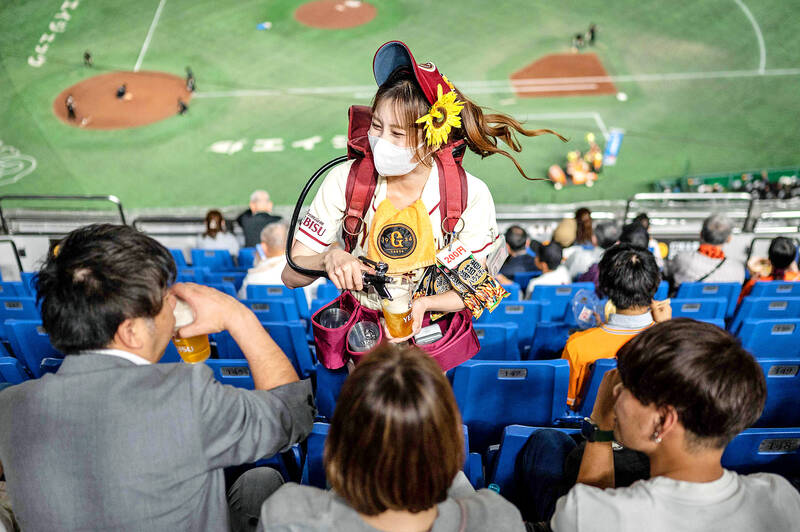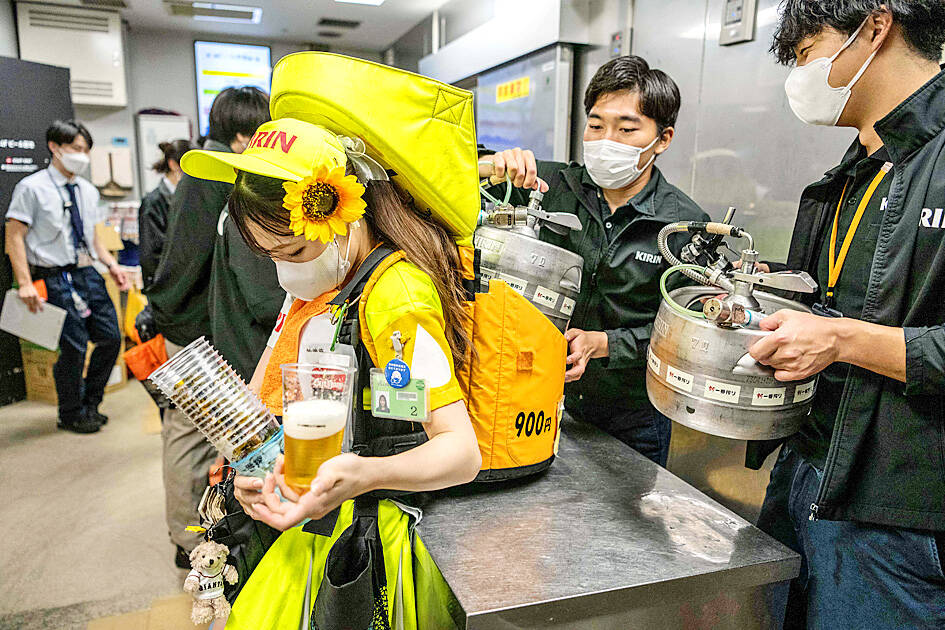In between chanting fans at Japan’s Tokyo Dome baseball stadium race an army of women in fluorescent uniforms carrying unwieldy backpacks with attached spray-guns.
These are the “uriko” — beer vendors who are as unique to Japanese baseball as the cheering sections that beat drums and blow horns to rally their teams.
Made up almost exclusively of young women in miniskirts or shorts, the tradition might appear outdated to some.

Photo: AFP
Warning: Excessive consumption of alcohol can damage your health
Japan has had its own low-key #MeToo movement, and women have in the past few years challenged everything from high heels at work to traditions requiring they serve tea to colleagues.
However, the uriko remain a firm favorite with fans of Japan’s most popular sport, which attracts a diverse crowd of men and women, as well as many families.
Honoka Hagiwara, who carries a keg weighing up to 15kg on her back for upward of three hours at a time, said she was attracted by the job’s “glamorous” image.

Photo: AFP
Warning: Excessive consumption of alcohol can damage your health
“I’ve been doing it for just over a year now, and I’ve got much more used to it,” the 22-year-old said.
She said that it was “physically very tough” at first, but she now enjoys the highly competitive job, with more than 100 rivals working any given game.
At Tokyo Dome, home to Japan’s most popular baseball team, the Yomiuri Giants, vendors sell an average of about 20,000 glasses of beer at a night game.
All the stadium’s vendors are women, although some men are employed at other stadiums in Japan.
It used to be the other way around: Until the 1980s, most vendors were men who sold beer from flat tables slung around their necks.
Tokyo Dome said the job is still open to anyone.
“There is not and will not be any obstacle standing in the way of men being employed,” a Tokyo Dome spokeswoman said.
Yet “around 100 times more” women apply than men, “so the result is that there are no men,” she said.
Uriko Mariko Matsumoto said she enjoys interacting with fans, and has built up a relationship with regulars.
The 25-year-old said she treats her customers the way she wants vendors to serve her at a game.
“I like going to watch baseball games myself, and when I see a vendor smiling, it makes me want to buy a drink,” Matsumoto said.
However, not all vendors have such a positive view of the job.
One former uriko said that the job was “creepy, creepy, creepy,” on a blogging site hosted by the Asahi Shimbun newspaper.
“It didn’t take me long to realize that I wasn’t only selling beer and snacks — I was selling myself,” said the author, who complained of customers asking to take her photograph and giving her unwanted business cards.
Security is on hand should drunk supporters get out of line, but trouble is rare at Japanese baseball games, which are a family day out for many.
Matsumoto said that her main concern is sales, and she is “always thinking” about her numbers.
“You’re paying attention to how much the others have sold and you’re ... trying to sell more than you did the day before,” she said.
Commission-based wages means it pays to work fast, although Hagiwara said that not keeping the customer waiting is the “top priority.”
While vendors are technically not allowed to run in the stands or on the stadium concourse, they are often seen racing from customer to customer.
They are easy to spot in brightly colored uniforms and artificial flowers in their hair beneath high-brimmed caps.
Some wear knee pads, as they have to bend down while serving to avoid obstructing the view.
They change kegs about 10 or 12 times a night with a speed that would put some Formula One pit stops to shame.
As support staff lift out the empty keg and replace it with a new one, vendors barely have time for a sip of cold tea — and sitting down for a breather is out of the question.
Hagiwara said more men should try the job, but not everyone at Tokyo Dome was so sure.
“A man? I’ve never thought about that,” said Sachiko Shibuya, 64, watching the game with her friend.
Yoshie Eki, 59, said she was not bothered who was dispensing the drinks.
“If I’m coming to the ballpark, I’m going to buy beer — it gets you more in the mood,” she said.

Mercuries Life Insurance Co (三商美邦人壽) shares surged to a seven-month high this week after local media reported that E.Sun Financial Holding Co (玉山金控) had outbid CTBC Financial Holding Co (中信金控) in the financially strained insurer’s ongoing sale process. Shares of the mid-sized life insurer climbed 5.8 percent this week to NT$6.72, extending a nearly 18 percent rally over the past month, as investors bet on the likelihood of an impending takeover. The final round of bidding closed on Thursday, marking a critical step in the 32-year-old insurer’s search for a buyer after years of struggling to meet capital adequacy requirements. Local media reports

US sports leagues rushed to get in on the multi-billion US dollar bonanza of legalized betting, but the arrest of an National Basketball Association (NBA) coach and player in two sprawling US federal investigations show the potential cost of partnering with the gambling industry. Portland Trail Blazers coach Chauncey Billups, a former Detroit Pistons star and an NBA Hall of Famer, was arrested for his alleged role in rigged illegal poker games that prosecutors say were tied to Mafia crime families. Miami Heat guard Terry Rozier was charged with manipulating his play for the benefit of bettors and former NBA player and

The DBS Foundation yesterday announced the launch of two flagship programs, “Silver Motion” and “Happier Caregiver, Healthier Seniors,” in partnership with CCILU Ltd, Hondao Senior Citizens’ Welfare Foundation and the Garden of Hope Foundation to help Taiwan face the challenges of a rapidly aging population. The foundation said it would invest S$4.91 million (US$3.8 million) over three years to foster inclusion and resilience in an aging society. “Aging may bring challenges, but it also brings opportunities. With many Asian markets rapidly becoming super-aged, the DBS Foundation is working with a regional ecosystem of like-minded partners across the private, public and people sectors

BREAKTHROUGH TECH: Powertech expects its fan-out PLP system to become mainstream, saying it can offer three-times greater production throughput Chip packaging service provider Powertech Technology Inc (力成科技) plans to more than double its capital expenditures next year to more than NT$40 billion (US$1.31 billion) as demand for its new panel-level packaging (PLP) technology, primarily used in chips for artificial intelligence (AI) applications, has greatly exceeded what it can supply. A significant portion of the budget, about US$1 billion, would be earmarked for fan-out PLP technology, Powertech told investors yesterday. Its heavy investment in fan-out PLP technology over the past 10 years is expected to bear fruit in 2027 after the technology enters volume production, it said, adding that the tech would